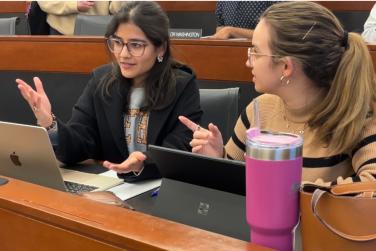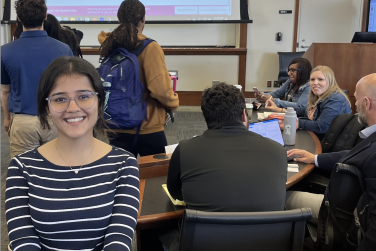
5 Things I've Learned in my First Weeks of Grad School
Starting graduate school is an exciting yet difficult transition, especially when balancing other significant responsibilities and priorities. As I begin my Masters in Human Resource Management (MHRM), I've learned several lessons in my first few weeks that have already been invaluable in managing this new phase in my life.
1.Create a Schedule for Your Week
With evening classes, two part time jobs, a serious relationship, exercise, homework, and family and friends to keep up with, I've already realized that planning will be essential to success this semester. "Winging it" is not a responsible option if you want to maximize your productivity and maintain balance in your day-to-day life. I've determined that mapping out my week on Sundays will help me prioritize commitments and tasks, and reduce the stress that comes from having to balance (and remember) everything going on in a week. Whether it's a weekly schedule of TO DO, WILL DO, and COMPLETED, an hourly schedule, or even just a priority list, planning is key. This structured approach to the week ahead will allow you to tackle one task at a time, rather than feeling overwhelmed by everything at once.
2. Take Full Advantage of Your Program's Offerings
One of the best parts of studying at Fisher (and OSU as a whole) is the limitless resources, offerings, and benefits you have access to as a student. Whether required, optional, or just-for-fun, taking advantage of what your grad program offers you will be a key to success. The MHRM program started with two orientation days that were enriching and highly informational, and provided a strong introduction to what I could expect from my next three semesters. Orientation was an excellent opportunity to network with my new peers and professors, as well as familiarize myself with program expectations and key dates. Additionally, the program offered mock interviews, resume reviews, and employer information sessions- all within the first week of classes! Graduate school is not just about academic growth, it's also about professional development, so attending sessions and taking advantage of benefits will help make connections and gain insights that will be crucial to you as you advance in your career.
3. Adapt to a New Academic Rigor
Grad students come from all walks of life, whether they're coming directly from undergrad, a career break or change, or even a few years in the workforce. Even if you have just graduated, one of the biggest adjustments of grad school is the increased rigor. The workload may be heavier, the readings more lengthy, and the expectations higher than previous schooling. To put your best foot forward, professors expect you to come to class prepared, contribute to class discussions, and engage at a deeper level than you may be used to in the past. While any shift can be overwhelming at first, I have told myself that grad school is designed to challenge me and aid in my professional development. Staying organized, keeping up with readings/assignments, and asking for guidance when necessary will be key to a successful semester.
4. Group Chats
One aspect of graduate school that has already continued from undergrad is team projects and group papers. Connecting and trusting peers that you barely know can be challenging, and one thing I know that helped me in my undergraduate studies was making group chats. In two weeks alone, I've been assigned three different groups that will correspond with a project/paper/presentation of sorts, and having a way to communicate and get to know your groups will help prepare you for what is to come. One tool that has already been incredible is When2Meet. This website allows all group members to fill out a calendar or weekly schedule with available times during the week that they are "free", and allows for a seamless view of what days and times a group is all available. Many of my peers work full-time jobs or have families and other commitments, so having a set time to meet from the get-go will put you in the best possible position to succeed.
5. Build Relationship with Peers AND Professors
While it may seem obvious at first, making connections with peers and professors is one of the most important and long-lasting things you can do when you are in school. One of my biggest regrets from my undergrad is not setting more time aside to go to office hours with impactful professors, or striking conversation with someone new in class. As this semester begins, I am making a conscious effort to attend office hours one to two times a month, regardless of whether or not I have questions. Additionally, sitting somewhere new every few classes ensures you connect with people you may not have had the chance to do so with, and prevents the infamous "unassigned assigned seat" scenario.
I look forward to using what I've learned thus far, and hope this post has provided valuable tips from my experiences these first few weeks!







